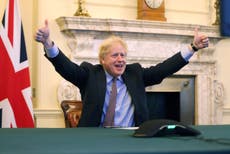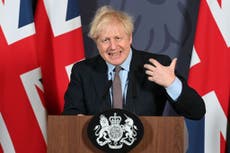Brexit: What is in Boris Johnson’s EU trade deal?
Fisheries, standards and governance were most fiercely contested element of deal
Your support helps us to tell the story
From reproductive rights to climate change to Big Tech, The Independent is on the ground when the story is developing. Whether it's investigating the financials of Elon Musk's pro-Trump PAC or producing our latest documentary, 'The A Word', which shines a light on the American women fighting for reproductive rights, we know how important it is to parse out the facts from the messaging.
At such a critical moment in US history, we need reporters on the ground. Your donation allows us to keep sending journalists to speak to both sides of the story.
The Independent is trusted by Americans across the entire political spectrum. And unlike many other quality news outlets, we choose not to lock Americans out of our reporting and analysis with paywalls. We believe quality journalism should be available to everyone, paid for by those who can afford it.
Your support makes all the difference.The EU-UK Trade and Cooperation Agreement sets out arrangements for tariff-free, quota-free trade in goods, but has little to say about services and does not settle key questions on financial services and data, which are expected to be subject to separate agreements.
By striking a deal, the two sides avoid having to switch onto World Trade Organisation terms on 1 January, which would have required tariffs on imports and exports ranging from 10 per cent on cars to 40-80 per cent on meat products and an average 18 per cent on foodstuffs.
However, the agreement does not guarantee frictionless trade. New paperwork will be a massive extra burden on businesses, with firms expected to have to fill in more than 200 million customs declarations annually.
Here are some of the key features of the deal:
Fisheries: The issue which almost broke the deal, despite accounting for only a tiny fraction of 1 per cent of the UK and EU economies. A phase-in period lasting five and a half years will gradually see the amount of fish available for UK boats increased, with the EU giving up 25 per cent of its share, worth £146m. After this, quotas will be negotiated annually.
Level playing field: Another fiercely contested issue, determining the extent to which the UK will be allowed to diverge from EU standards on workplace rights and environmental standards. Both sides agree not to regress below December 2020 standards, but the EU has given up its demand for a ratchet mechanism allowing it to apply automatic sanctions if the UK fails to keep up with Brussels regulations. Instead there is a rebalancing mechanism which can be triggered by either side only in regard to changes which have a clear impact on trade. A panel of experts will be created to settle disputes. The UK is not required to follow EU rules on state aid subsidies to businesses, but must observe principles set out in the treaty.
Governance: The UK has succeeded in its bid to deny the European Court of Justice a place in settling disputes over the application of the deal. Differences will be resolved on the basis of international law. A joint partnership council will be created with arbitration powers.
Rules of origin: Flexibility introduced to allow inputs from either the UK or EU side into a finished product to be counted as domestic, in order to permit the continued operation of complex cross-border supply chains. Mutual recognition of “trusted trader” schemes to allow smoother flow of goods. No agreement on the observation of geographical indications for renowned local foods like stilton cheese or Melton Mowbray pork pies.
Services: Service suppliers and investors from either side to be treated no less favourably than domestic operators. Public procurement markets to be open to bidders from both sides on an equal footing. Removal of unjustified barriers to digital trade. Both parties to agree a memorandum of understanding on financial services by March 2021 to establish framework for regulatory cooperation.
Security: UK excluded from Schengen Information System on border management and security, but agreement on operational cooperation. Mechanisms for swift exchange of criminal records, fingerprints, DNA, passenger name records and vehicle registration information. UK to be treated as a “third country” in relation to Europol and Eurojust. Fast-track arrangements for extradition with safeguards in cases where rights are at risk.
EU programmes: UK to pay for participation in Horizon Europe, Euratom, ITER and Copernicus projects and to have access to EU satellite surveillance and tracking services.
Climate: Enforceable commitments on Paris Agreement and non-regression on climate change and carbon pricing.
Social security: UK to be allowed to restrict access to family benefits for EU citizens without permanent residence. Coordination of some benefits, such as pensions and access to healthcare.
Aviation: Unlimited point-to-point traffic between EU and UK airports. Cooperation on aviation safety, security and air traffic management.
Road transport: Unlimited point-to-point access for hauliers and full transit rights across one another’s territory. “Cabotage” rights allowing hauliers to carry out up to two extra operations in the other party’s territory.
Energy: Guarantees on security of energy supply. Offshore co-operation in the North Sea.
Special arrangements for wine, organics, automotive, pharmaceuticals and chemicals.





Join our commenting forum
Join thought-provoking conversations, follow other Independent readers and see their replies
Comments